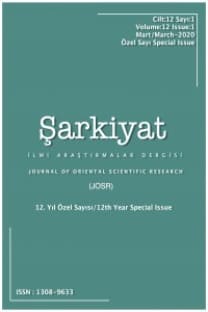AHLAK-BENLİK BÜTÜNLÜĞÜ: AHLAKİ KİMLİK
Ahlaki eylemi tam olarak motive eden şey nedir? Ahlaki motivasyona ilişkin teori ve araştırmalar son dönemlerde ahlaki muhakemenin statüsüne odaklanmıştır. Ancak son zamanlarda, ahlaki motivasyonun önemli bir kaynağı olarak kimlik de ön plana çıkmaktadır. Bir birey, benlik duygusunu ahlaki kaygılar-değerler etrafında inşa ettiği ölçüde ahlaki bir kimliğe sahip olur. Ahlaki yargı-eylem boşluğunu kapatmaya yardımcı olabilecek ahlaki kimlik, kişinin kimliği için ahlaki bir kişi olmanın ne anlam taşıdığını vurgulamaktadır. Burada ahlaki kaygılar ile kişisel kaygılar birleştiği/bütünleştiği için ahlaki kimlik gerçek benlik olur; ve bireyin eylemlerini yönlendiren en derin ilke olarak deneyimlenir. Kimliğin ahlaki işleyişte önemli bir rol oynayabileceğine ilişkin bu düşünce ahlaki kimliğe yönelik çalışmalara ilgiyi de artırmıştır. Bu makale, ahlaki kimlik ile ahlaki davranış arasındaki ilişkiye yönelik bir araştırmayı hedeflemektedir.
Anahtar Kelimeler:
Ahlaki kimlik, Ahlaki motivasyon, Ahlaki eylem, Ahlaki gelişim
___
- Aiken, Henry David, “Moral Reasoning”, Ethics, Vol. 64, No. 1 (1953).
- Aquino, Karl, “ The Self-Importance of Moral Identity”, Journal of Personality and Social Psychology, Vol. 83, No. 6, (2002).
- Bergman, Roger, “Why Be Moral? A Conceptual Model from Developmental Psychology”, Human Development, (2002).
- Brook, Angus, “What is Education?: Re-reading Metaphysics in Search of Foundations”, New Blackfriars, Vol. 94, No. 1049 (2013).
- Carr, David, “Character Education as the Cultivation of Virtue”, Handbook of Moral and Character Education, ed. Larry P. Nucci, Darcia Narvaez, (New York: Routledge, 2008).
- Duska, Ronald, Whelan, Mariellen, Moral Development: A Guide to Piaget and Kohlberg, ed. Ronald Duska and Mariellen Whelan, (New York, Paramus, Toronto: Paulist Press, 1975).
- Hardy, Sam A., Carlo, Gustavo, “Identity as a Source of Moral Motivation”, Human Development 48, (2005).
- _____ “Moral Identity: What Is It, How Does It Develop, and Is It Linked to Moral Action?”, Child Development Perspectives, Volume 5, Number 3, (2011).
- Heinrichs, Karin, Oser, Fritz Oser, Lovat, Terence, (ed), Handbook of Moral Motivation, (Rotterdam: Sense Publishers, 2013).
- Kant, Immanuel, “Lectures on Pedagogy”, Translated by Robert B. Louden, Anthropology, History, and Education, ed. Gunter Zoller, Robert B. Louden, (Cambridge: Cambridge University Press, 2007).
- Krettenauer, Tobias, Hertz, Steven, “What Develops in Moral Identities? A Critical Review”, Human Development, Vol. 58, No. 3 (2015).
- Lapsley, Daniel K., “Moral Self-Identity as the Aim of Education”, Handbook of Moral and Character Education, ed. Larry P. Nucci, Darcia Narvaez, (New York: Routledge, 2008),
- Lapsley, Daniel K., Narvaez, Narvaez, Moral Development, Self, and Identity, ed. Daniel K. Lapsley and Darcia Narvaez, (London: Lawrence Erlbaum Associates, 2004).
- Narvaez, Darcia, “Neurobiology and Moral Mindset”, Handbook of Moral Motivation, (ed), Karin Heinrichs, Fritz Oser and Terence Lovat , (Rotterdam: Sense Publishers, 2013).
- Narvaez, Darcia, Lapsley, Daniel K. Personality, Identity, and Character, ed. Darcia Narvaez and Daniel K. Lapsley, (New York : Cambridge University Press, 2009).
- Noddings, Nel, Caring, (Berkeley and Los Angeles, California: University of California Press, 1986).
- Nofal, Nabil, “Al-Ghazali”, Prospects: the Quarterly Review of Comparative Education, (Paris: International Bureau of Education), vol. XXIII, no. 3/4, (1993).
- Norman, Richard, The Moral Philosophers, (Oxford: Oxford University Press, 1998).
- Riley, Sean, “Moral Identity and Moral Education: A Roycean Proposal for School Choice”, The Pluralist, Vol. 2, No. 2 (2007).
- Schlenker, Barry R., Miller, Marisa L., Johnson, Ryan M., “Moral Identity, Integrity, and Personal Responsibility”, Personality, Identity, and Character, ed. Darcia Narvaez and Daniel K. Lapsley, (New York : Cambridge University Press, 2009).
- Schwartz, Merle J. “Teacher Education for Moral and Character Education”, Handbook of Moral and Character Education, ed. Larry P. Nucci, Darcia Narvaez, (New York: Routledge, 2008).
- Sichel, Betty A., “Virtue and Character: Moral Languages and Moral Education”, The Clearing House, Vol. 64, No. 5, (1991).
- Spiecker, Ben, Steutel, Jan, “Moral Identity and Education in a Multicultural Society”, Studies in Philosophy and Education 15: 159-165, (1996).
- Stets, Jan E., Carter, Michael J., “The Moral Self: Applying Identity Theory”, Social Psychology Quarterly, Vol. 74, No. 2, (2011).
- Taylor, Charles, Sources of the Self: The Making of the Modern Identity, Harvard University Press, 1989).
- Thoma, Stephen J., Muriel J. Bebeau “Moral Motivation and the Four Component Model”, Handbook of Moral Motivation, (Rotterdam: Sense Publishers, 2013).
- Wren, Thomas, “Philosophical Moorings”, Handbook of Moral and Character Education, ed. Larry P. Nucci, Darcia Narvaez, (New York: Routledge, 2008).
- Xu, Zhi Xing, Ma, Hing Keung, “How Can a Deontological Decision Lead to Moral Behavior? The Moderating Role of Moral Identity”, Journal of Business Ethics , September 2016, Vol. 137, No. 3 (2016).
- Başlangıç: 2009
- Yayıncı: Şarkiyat Araştırmaları Derneği
Sayıdaki Diğer Makaleler
19. YÜZYILIN İKİNCİ YARISINDA SİİRD SANCAĞINDA İHTİDA HAREKETLERİ (1868-1898)
AKLI İLİM KAVRAMIYLA TANIMLAMANIN KELAMÎ AÇIDAN DEĞERLENDİRİLMESİ
İŞÂRÎ TEFSİR MUKADDİMELERİ ÜZERİNE BİR DEĞERLENDİRME: TÜSTERİ, SÜLEMİ VE KUŞEYRÎ ÖRNEĞİ
SEYDA MOLLA HALİD KORKUSUZ’UN İLMÎ VE EDEBÎ KİŞİLİĞİ
FAHREDDÎN RÂZÎ’NİN İ‘CÂZ DÜŞÜNCESİNDE BİR KIRILMA NOKTASI OLARAK SARFE TEMAYÜLÜ TARTIŞMASI
AHLAK-BENLİK BÜTÜNLÜĞÜ: AHLAKİ KİMLİK
ZÜBDEÜ’L-VEKÂYİʻ (İRANLI BİR DİPLOMATIN GÖZLEM RAPORLARI)
18. YÜZYILDA ERZURUM EYALETİ’NDE YEREL SİYASET VE YEZİDİ AŞİRETLERİN ROLLERİ
